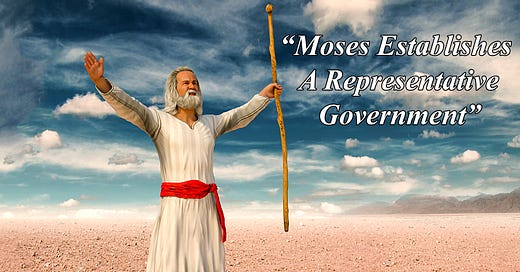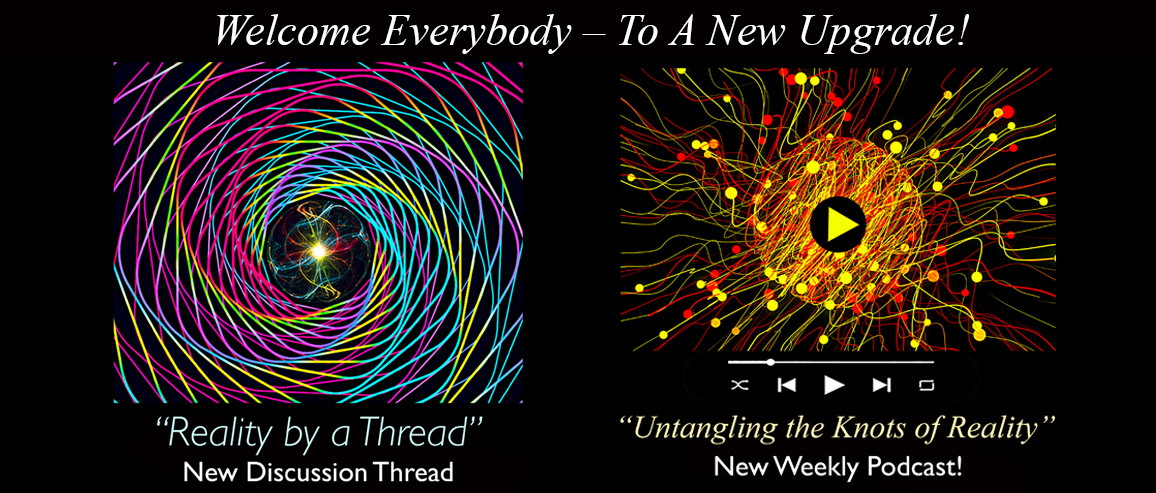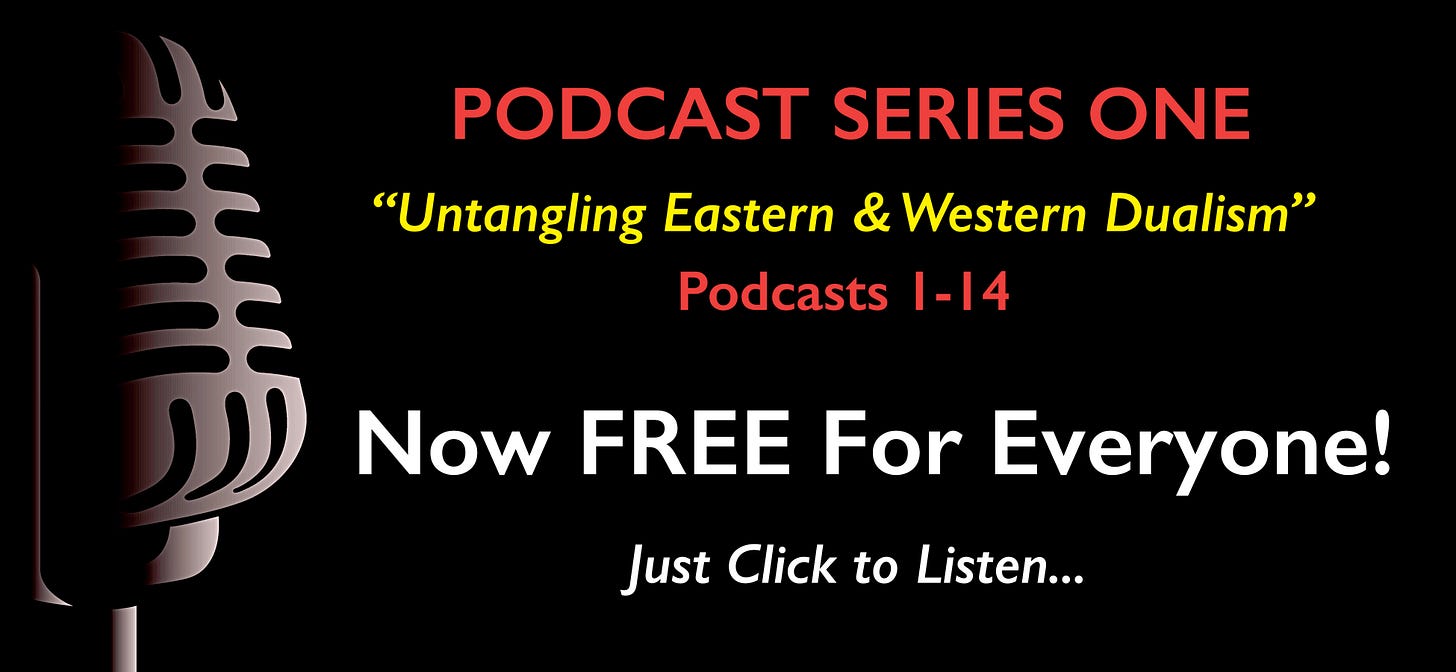How Things Work: A Brief History of Reality
BOOK II: The Power of Three (Science & Religion) – Consideration #91. "Moses Establishes A Representative Government"
Be a part of the Conversation!
Tuesday July 11, 2023
“The Hebrews have done more to civilize men than any other nation. If I were an atheist, and believed blind eternal fate, I should still believe that fate had ordained the Jews to be the most essential instrument for civilizing the nations.”
- John Quincy Adams
Three Days Only! 20% OFF ALL PRINTED BOOKS!! (July 12 - 14)
STARTS TOMORROW! Blurb Promo Code: BSF20
PREFACE
Welcome Everybody!
As Moses takes on more responsibility for the Israelites and the new “nation” of Israel, he discovers that managing such a large group of discontented human beings is a very difficult endeavor. Many of the original challenges God had faced with Moses and his lack of faith, Moses was now experiencing with “his people.”
Moses was beginning to understand why God would later call the Israelites a “stiff-necked” people. Much like Moses at the beginning of the story, the Israelites were always complaining about something. Eventually overwhelming Moses and his ability to manage the tribe, or nation, by himself. Moses had to find a way to “govern” the new nation of Israel.
The answer was to set up a new form of “representative” government with authority moving from God to Moses, to representatives of the community, to the people.
CONSIDERATION #91 – “Moses Establishes A Representative Government”
Moses Becomes Overwhelmed (Exodus 17 & 18)
Moses was beginning to become overwhelmed with the responsibility of acting as an intermediary between God and the Israelites. The stress of dealing with so many people and their problems were becoming too much for one person to handle, even Moses. It had become a constant cacophony of complaints that seemed never ending.
So they quarreled with Moses and said, “Give us water to drink.”
Moses replied, “Why do you quarrel with me? Why do you put the Lord to the test?”
But the people were thirsty for water there, and they grumbled against Moses. They said, “Why did you bring us up out of Egypt to make us and our children and livestock die of thirst?”
Then Moses cried out to the Lord, “What am I to do with these people? They are almost ready to stone me.”
Exodus 17:2-4
God tells Moses to strike a rock with his staff and water would come out of the rock. He emphasizes that Moses should do this in front of the people, especially the elders. Moses faithfully follows God’s directions and water pours from the rock, as promised. However, once again, God was forced to use a miracle in order to maintain the faith and cooperation of “His” people. His words, and even His previous actions, seemed never enough.
Moses began to empathize with God regarding people who had more demands than faith. Knowing that he also, had previously been one of them. The burden of dealing with so many people under such extremely harsh conditions was starting to take a toll on Moses.
Moses’ father-in-law, Jethro, a priest of Midian, went out into the desert to visit with Moses. However, Jethro is shocked to see Moses trying to solve everyone’s problems all day and night.
“When his father-in-law saw all that Moses was doing for the people, he said, ‘What is this you are doing for the people? Why do you alone sit as judge, while all these people stand around you from morning till evening?’”
Exodus 18:14
Moses explains that he was the only intermediary who could talk directly to God for the people.
“Because the people come to me to seek God’s will. Whenever they have a dispute, it is brought to me, and I decide between the parties and inform them of God’s decrees and instructions.”
Exodus 18:15-19
However, Jethro would not be deterred.
“What you are doing is not good. You and these people who come to you will only wear yourselves out. The work is too heavy for you; you cannot handle it alone. Listen now to me and I will give you some advice…”
Exodus 18:18-19
Essentially, Jethro advises Moses on how to set up a form of representative government for the new nation of Israel that spreads the responsibility of leadership among specially chosen representatives of the people, with Moses remaining the sole representative directly to God.
You must be the people’s representative before God and bring their disputes to him. Teach them his decrees and instructions, and show them the way they are to live and how they are to behave. But select capable men from all the people – men who fear God, trustworthy men who hate dishonest gain – and appoint them as officials over thousands, hundreds, fifties and tens. Have them serve as judges for the people at all times, but have them bring every difficult case to you; the simple cases they can decide themselves. That will make your load lighter, because they will share it with you. If you do this and God so commands, you will be able to stand the strain, and all these people will go home satisfied.”
Exodus 18:19-23
Moses listens to Jethro’s advice, and things begin to become more manageable for him and the people. Just as Moses was implementing his strategy to help manage the new nation, God was working on a new strategy as well.
POSTSCRIPT
In the Book of Exodus, several key principles related to what would later be considered “enlightened” government in the Age of Reason are clearly established. First, as learned in the Garden of Eden, there is a natural hierarchy of power and authority in the empirical world.
However, there is also a necessary balance of power and authority that is shared within that hierarchy. A key factor in successfully maintaining this balance is the concept of Universal Law. This Biblical consideration of “good government” eventually merges with the Greek concepts of Wisdom, Justice and Politics to manifest the first Constitutional Representative Democratic Republic: The United States of America.
“For successful government to be possible the power and authority of those being governed must also be represented within the hierarchy.”
God, like the office of the President, represents the most powerful manifestation of individual authority within the hierarchy. However, this power and authority alone is not enough to make things work. For successful government to be possible the power and authority of those being governed must also be represented within the hierarchy. Individuals in the society must be involved in their own government; even a Leviathan cannot manage the weight of governing without a basic partnership with the people.
“…the power and authority of the ruler, or leader, is dissipated and shared with the general citizenry through a hierarchy of representatives promoting their interests and concerns.”
In the Garden of Eden, a natural hierarchy of power is established as a necessary aspect of the empirical world. A forceful authority figure, or Leviathan, is essential for maintaining the basic structure and foundation of a civilized society; strong leaders are necessary. However, it does not reflect the idea of an “all powerful” tyrannical dictator who shares authority with no-one.
In this story we see how the power and authority of the ruler, or leader, is dissipated and shared with the general citizenry through a hierarchy of representatives promoting their interests and concerns. At some point God, Moses, and the President, must all listen and consider what their constituents have to say.
The United States government reflects a hierarchy of power shared through three branches of government, which all serve as “representatives” for the entire population. Although the Executive Branch of government is controlled by one single entity, or Leviathan, called “the President,” its power is shared with, and balanced by, the Legislative and Judicial branches of government. However, what ties everything together is a document called the Constitution. The Constitution represents the first attempt at manifesting Complete Universal Law into a society since Moses and the nation of Israel.
“The Constitution represents the first attempt at manifesting Complete Universal Law into a society since Moses and the nation of Israel.”
It is important to remember that God’s goal in the Bible is to re-establish a relationship with “mankind,” not to simply dominate mankind. Domination is easy. Relationship is not. It requires the voluntary cooperation of both parties to be successful. In the Book of Exodus, the idea of empirical government becomes a part of that relationship.
Next week we will consider perhaps the most consequential story of the Old Testament that establishes the essence of Judaism and directly affects Enlightenment philosophy and the founders of the United States: Moses and the Law.
This Week on “The Thread”…
Excerpt from Podcast #52 “The Foundational Flaw of America: Part-4 – Manifesting the Promise of America”
Expand the Conversation by Upgrading to “Reality by a Thread!”
•Untangling the Knots of Reality: Podcast #52 “The Foundational Flaw of America: Part-4 – Manifesting the Promise of America” (“In 1963, major civil rights organizations, including the SCLC, led a march on Washington D.C. in the sweltering summer heat to focus the nation’s attention on their cause. More than a quarter-million Americans filled the steps of the Lincoln Memorial, spilling onto the National Mall. Dr. King delivered a seventeen-minute speech using the promise of America to focus on the problem in America. After the introduction in the “I Have a Dream Speech,” Dr. King refers to Abraham Lincoln’s Gettysburg Address, and the Emancipation Proclamation, and the hope for the liberty and freedom they had promised…”)
• “Reality by a Thread” Discussion Thread: BOOK VI PREVIEW (The Rational Being) – “Quantum Thinking” (“Unlike human beings, who are forced to balance the duality of rational and empirical reality, Artificial Intelligence is a purely Rational Being. Until now, our only consideration of a purely Rational Being has been the rational abstract concept generally known as God...”)
•FREE PDF Download of Book IV: “The Cosmic Symphony – Overtones of String Theory” plus other Free Books, Discounts and Benefits. Also Gain Complete Access to all Previous Podcasts and Threads!
UPGRADE NOW!
Available Now!
Excerpt from PODCAST #5: "Untangling the Rational Mind"
If you find yourself growing tired of the same old meaningless fluff, this may be the Podcast you’ve been looking for!
Podcast #1 – A Lot of Explaining
Podcast #2 – Untangling Mathematics & Metaphors
Podcast #3 – Untangling the Garden of Eden
Podcast #4 – Untangling The Physical World
Podcast #5 – Untangling the Rational Mind
Podcast #6 – Untangling Eastern & Western Dualism
Podcast #7 – Untangling Zen & the Shaolin Temple
Podcast #8 – Untangling the Mystery of Taoism
Podcast #9 – Untangling The Noble Eightfold Path
Podcast #10 – Untangling Plato's Realm of Forms
Podcast #11 – Untangling Aristotle's Metaphysics
Podcast #12 – Untangling Happiness & Virtues
Podcast #13 – Untangling Self-Evident Truths
Podcast #14 – Untangling The Cosmic Symphony
“Untangling the Knots of Reality – Be A Part of the Conversation!”







